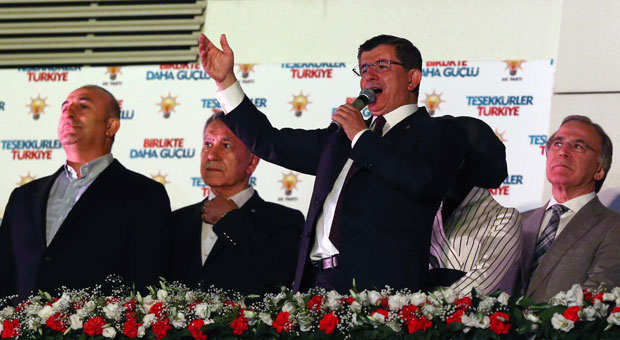Turkey election: governing party loses majority in surprise result
AKP suffers its worst result in more than a decade as Kurds celebrate shake up in Turkey's political landscape

A free daily email with the biggest news stories of the day – and the best features from TheWeek.com
You are now subscribed
Your newsletter sign-up was successful
Turkey's ruling party has lost its parliamentary majority following a shock general election result, dashing President Recep Tayyip Erdogan's plans to change the constitution and extend his powers.
The Justice and Development Party (AKP) has dominated Turkish politics since it first emerged in 2002, but only managed to secure 41 per cent of the vote in Sunday's poll. That translates to 258 seats in Turkey's 550-seat parliament.
President Erdogan had been seeking a clear majority in order to amend the country's constitution and turn Turkey into a presidential republic, a move which would have required a two-thirds majority.
The Week
Escape your echo chamber. Get the facts behind the news, plus analysis from multiple perspectives.

Sign up for The Week's Free Newsletters
From our morning news briefing to a weekly Good News Newsletter, get the best of The Week delivered directly to your inbox.
From our morning news briefing to a weekly Good News Newsletter, get the best of The Week delivered directly to your inbox.
"The results show that Turkish citizens want Erdogan to act in line with his position as a neutral president, Deniz Ulke Aribogan, a professor of political science at Istanbul Bilgi University, told Al Jazeera. "They don't want to see him rallying as if he is the leader of the AK party."
The AKP's worst election result in over a decade was the result of a slowing economy, stark policy divisions within the party as well as the rise of the pro-Kurdish People's Democratic party (HPD), the Financial Times reports. Erdogan's government is also facing increasing criticism for its growing authoritarianism and clampdown on free speech.
The progressive HPD party crossed the ten per cent threshold and will enter parliament for the first time after appealing to voters with its message of equality, gay rights and environmental concerns. The result means the Kurdish minority has finally gained a "significant voice" on the national stage, reports the BBC's Mark Lowen.
The Republican People's Party (CHP) looks set to become the largest opposition party, with 25 per cent of the vote, while the right wing Nationalist Movement Party (MHP) comes in third on 16.5 per cent. The result sees a record number of women in parliament, with an estimated 96 female parliamentarians in the grand national assembly, up from 79 in 2011.
A free daily email with the biggest news stories of the day – and the best features from TheWeek.com
Despite the results, the ruling party remains defiant, with Prime Minister Ahmet] Davutoglu insisting that the AKP is the "real winner" of the election. "Those who lost should not try to benefit from this," he warned. "The AKP will continue to be on duty."
The party is now expected to turn its attention to securing a coalition agreement, but senior party officials are predicting a minority government and an early election, The Guardian reports. Burhan Kuzu, AKP deputy and head of the parliamentary constitution commission, said snap elections looked inevitable. "No government will emerge from this scenario. Not even a coalition," he predicted.